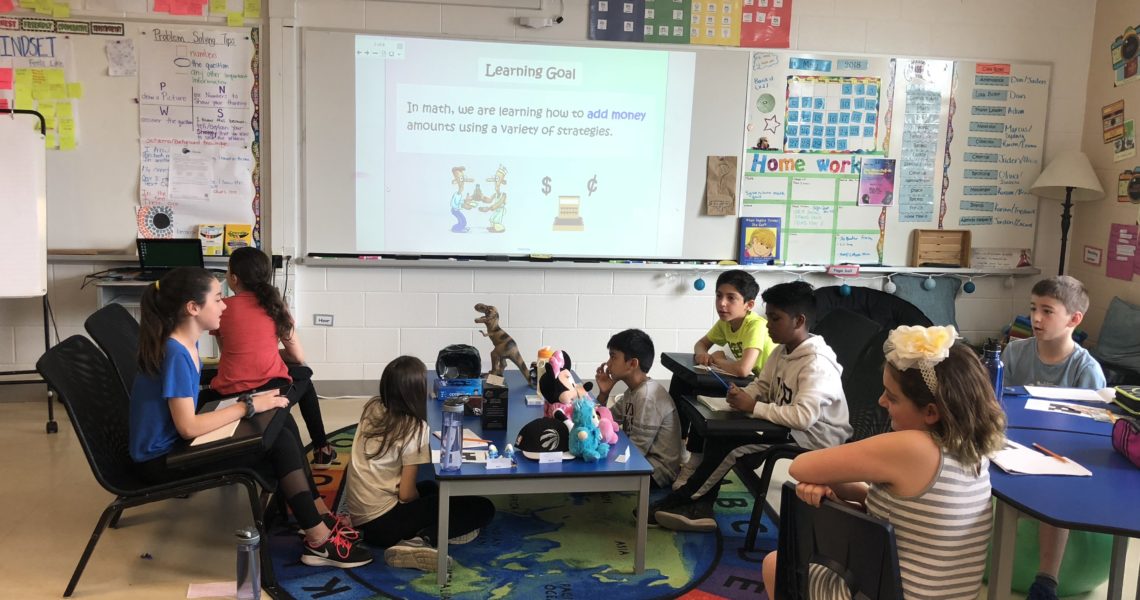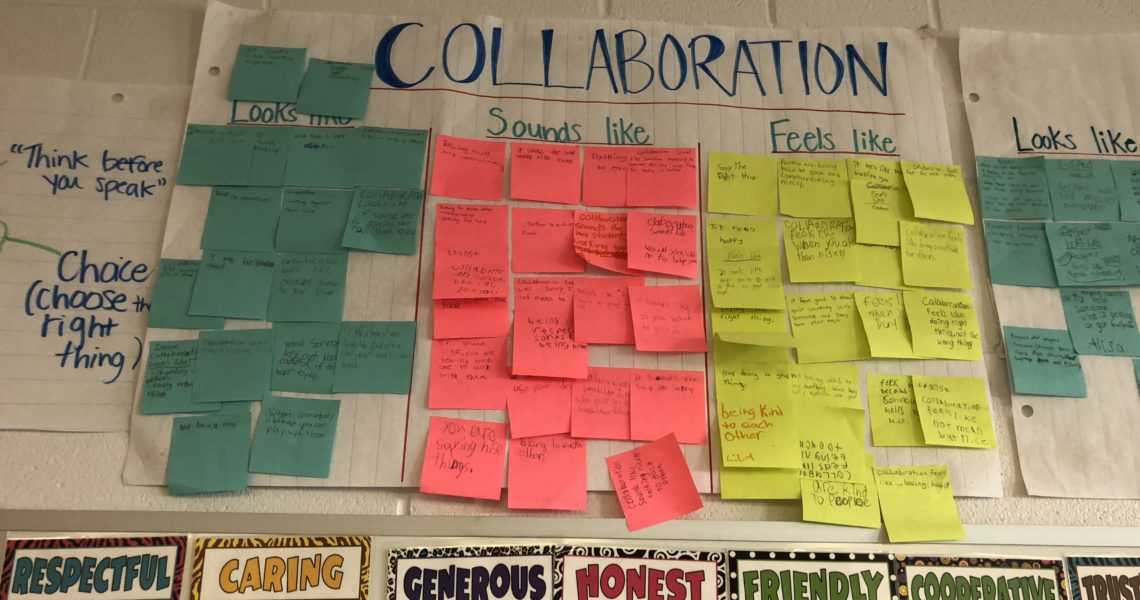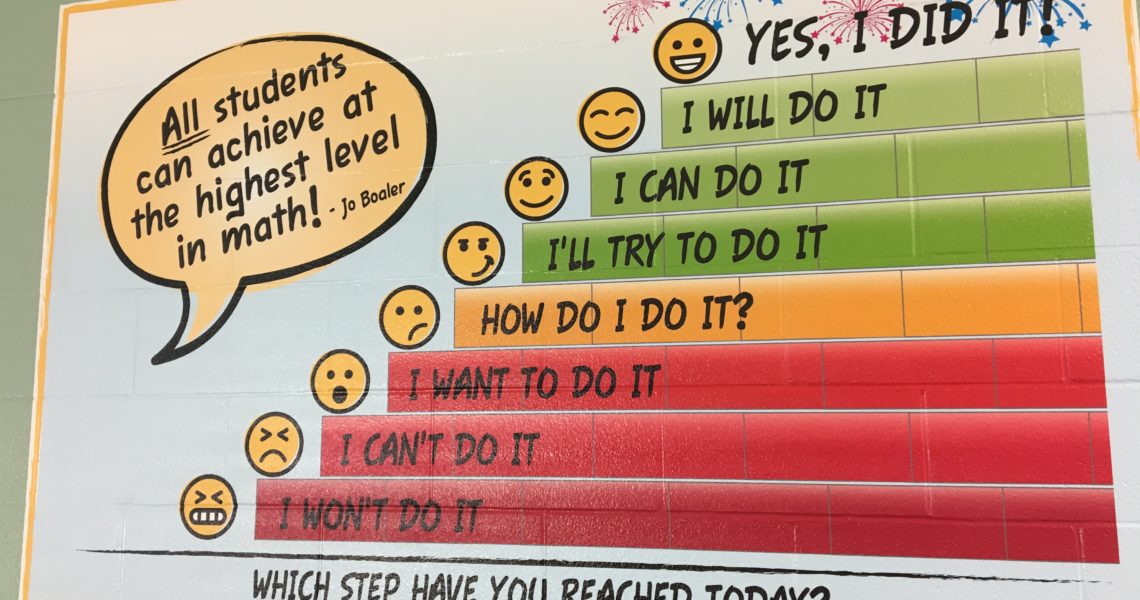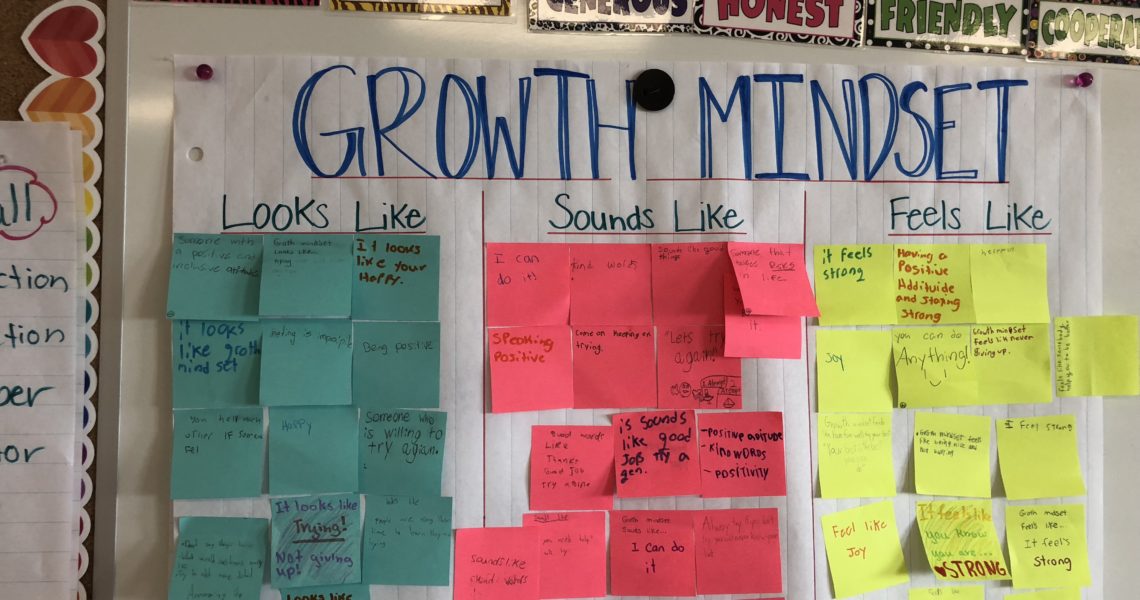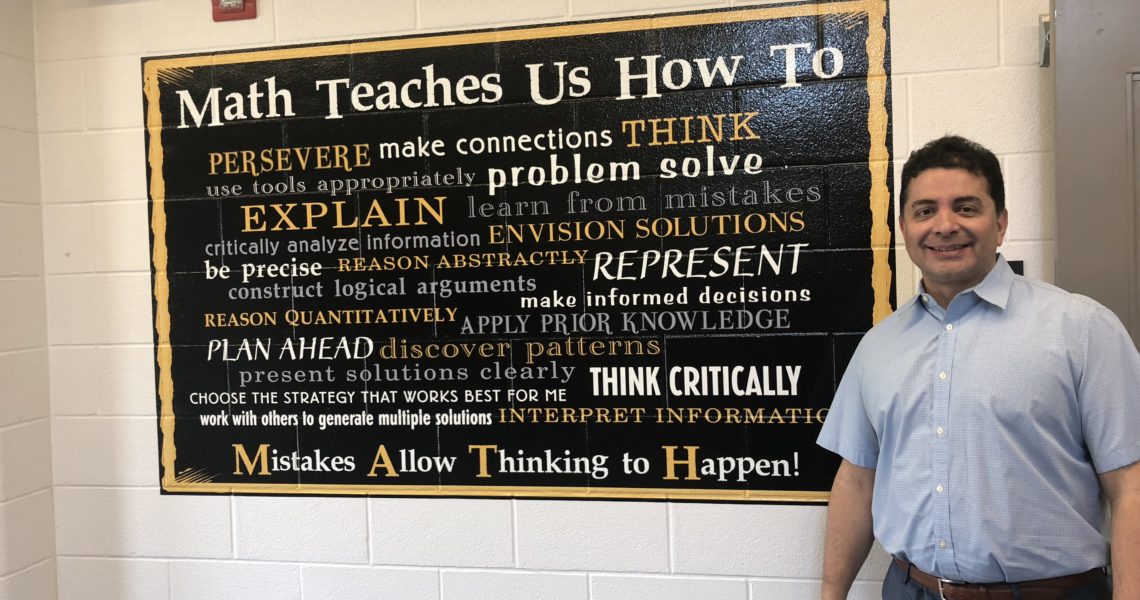St. Alphonsa Catholic Elementary (K-8) School in Ontario, Canada has embraced a growth mindset culture in all academic content areas, especially in math. Principal Mark Cassar first learned about mindset from professional development he learned from Jennifer Vieira, the board’s Math Coordinator at the time. Jennifer’s research and development of the co-learning and co-teaching stance was pivotal in furthering a better understanding of growth mindset. Much of St. Alphonsa success is a result of the staff’s application of this work. This PD was also delivered to administrators through attended the board’s Math and Wellbeing initiative. Capacity building was a pivotal aspect of this work. Mark furthered his learning on growth mindset through Jo Boaler’s Mathematical Mindset book, her TEDx talks, and the youcubed website. He embraced the brain science and mindset messages. Mark introduced his staff to these strategies and resources and co-constructed a plan with staff to help students embrace a growth mindset approach to their learning. Mark believes in leading by example and developing a co-learning stance with staff where no one is an “expert,” but instead all are willing contributors who learn with, and from others. As a staff, they agreed that students need to see their administrators and teachers as co-learners too and that mistakes are a part of learning. Based on their learning, a new K-8 school opened focused on integrating these ideas for students in their approach to teaching and messaging. The school has been open for almost three years now and students are experiencing a ‘mistake friendly environment and are developing positive self-beliefs – that they can learn anything.’ (Boaler, 2019). Administration, parents, staff and students are encouraged by the results of their growth mindset implementation. Students are comfortable making mistakes, learning math together, sharing ideas and working through problem solving with multiple strategies in mind.
Video of Student Interviews
Jo interviewed a range of students from age 7 to 10 and asked them about their experiences with maths and the school’s approach.
Assessment
This is an extract from Jo’s new book (Limitless Mind: Learn, Lead and Live without Barriers, Harper Collins-2019) describing the assessment changes made at the school:
The teachers at the school realized something important – that it is hard to tell students that mistakes are really useful for learning, but then penalize them in tests for every mistake they make. Mark captured the effect of such testing when he said: “Here’s a question, it’s out of 20, you already start with 20 but the second your pencil touches paper and a mistake is made, all you see is you lost a mark. The anxiety builds and the learning stops because it’s too late to do anything about it…and it just becomes about the mark.” The teachers still assess students but instead of giving an unhelpful number, and penalizing mistakes, they give what I often describe as the greatest gift teachers can give students – diagnostic comments on ways to improve, based on a leveled rubric. Mark said that at first the students looked for a number and that was all they cared about, which is often the result of a performance culture, (rather than a learning culture). But now students see the rubric, they understand where they are in their learning, and they read the teacher’s comments to know how to improve. This change in assessment is the ultimate way to share with students the message that growth and learning is what you value, and that you can help them improve with guidance. (Boaler, 2019)
Example Rubrics
Thank you to the following teachers from St. Alphonsa for sharing their rubric samples with us: Magda Wajzer, Chana Sousa, Maria Castrucci, Shawn Evon, Noralee Yarra, Jackie Crowley, Natalie Pileggi, Megan Venditti.
Making Change
One of the first things the school did was listen to what students had to say about their learning experiences in math. Student voice is a critical part of developing a school wide approach to wellbeing, so they conducted ad hoc interviews with students about their experiences with learning mathematics and how mathematics was taught to them over the years. The students were very direct with Mark and often told him how much they disliked mathematics, how they found it difficult to understand, and how much anxiety it caused them. In Mark’s words, ‘Many students went on about what a terrible experience it was for most of them…’ From the informal, anecdotal data collected from student responses, the staff realized that if student wellbeing in math is a priority, the approach to teaching mathematics needed to change. They recognized the need to teach mathematics through an approach of multiplicity, meeting students where they are. Having the student voices and sharing them with staff, motivated the willingness to change the culture of teaching and learning math at St. Alphonsa.
The need to make a positive cultural change starts with the inclusion of administration, staff, parents and students. St. Alphonsa staff regularly engage in professional development opportunities during staff meetings and professional development days. Using resources that include Jo Boaler’s Mathematical Mindset book and the Youcubed website, the staff work collaboratively to embrace new learning to help not only improve their own pedagogy, but to help develop a culture that embraces positive change.
St. Alphonsa staff engaged parents throughout the process. Parents were part of the shared vision of student wellbeing, growth mindset and addressing math anxiety. In an early School Council meeting, parents were given different problems so they could compare the experience of doing traditional mathematics with a multiplicity approach. In one example, parents were asked to do the problem 33 + 35 as a number talk. Next a problem was offered where two digits were removed, _2 + 5_ = 96. The parents reasoned through different strategies and approaches to this problem. Parents were also engaged in discussion about memorizing multiplication tables. In one instance, while some parents were able to recall 7 x 8, strategies for recalling 12 x 13 were virtually nonexistent without resorting to an algorithm. By leading parents through a collaborative exercise where multiple strategies were celebrated, the staff demonstrated the advantages of multiplicity in mathematics. In the end parents better understood the approach of teaching mathematics in an open and creative way.
The growth mindset approach of St. Alphonsa is not a one-time initiative. The staff emphasize it throughout the year. The first week of school is designed to build a growth mindset classroom community. Classroom activities promote respecting student voice in learning, embracing mistakes, developing a collaborative learning culture and the notion that all students can achieve to high levels in math. Teachers regularly communicate with parents the multiplicity approach to teaching and learning math. Students often celebrate by visiting Mark’s office to show off evidence of their math learning. The staff encourages risk taking and opportunities for students to share their mathematical thinking. Student learning is also celebrated at monthly assemblies, where awards involve teachers nominating students in recognition of their growth mindset learning and achievements. Another key component of sustaining the change are parent engagement nights where parents and students participate in math games and learning opportunities.
If you would like to get more information about St. Alfonsa’s approach contact the principal, Mark Cassar at Mark.Cassar@dpcdsb.org
You can also visit the school’s webpage at: https://www.dpcdsb.org/ALPHO
If you would like your school’s approach to be featured on youcubed, email schools@youcubed.org

